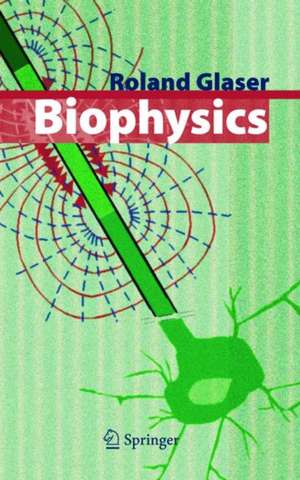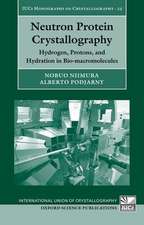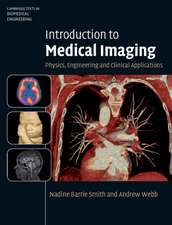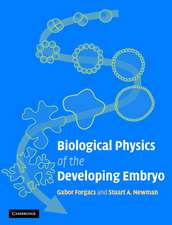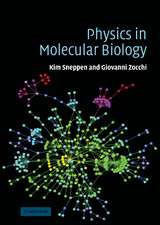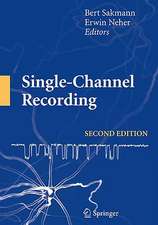Biophysics
Autor Roland Glaseren Limba Engleză Paperback – 14 oct 2010
| Toate formatele și edițiile | Preț | Express |
|---|---|---|
| Paperback (2) | 495.24 lei 6-8 săpt. | |
| Springer Berlin, Heidelberg – 20 apr 2012 | 495.24 lei 6-8 săpt. | |
| Springer Berlin, Heidelberg – 14 oct 2010 | 503.37 lei 6-8 săpt. | |
| Hardback (1) | 654.23 lei 6-8 săpt. | |
| Springer Berlin, Heidelberg – 20 apr 2012 | 654.23 lei 6-8 săpt. |
Preț: 503.37 lei
Preț vechi: 592.20 lei
-15% Nou
Puncte Express: 755
Preț estimativ în valută:
96.32€ • 100.84$ • 79.70£
96.32€ • 100.84$ • 79.70£
Carte tipărită la comandă
Livrare economică 05-19 aprilie
Preluare comenzi: 021 569.72.76
Specificații
ISBN-13: 9783642086397
ISBN-10: 364208639X
Pagini: 380
Ilustrații: XVI, 361 p. 133 illus.
Dimensiuni: 155 x 235 x 22 mm
Greutate: 0.53 kg
Ediția:1999
Editura: Springer Berlin, Heidelberg
Colecția Springer
Locul publicării:Berlin, Heidelberg, Germany
ISBN-10: 364208639X
Pagini: 380
Ilustrații: XVI, 361 p. 133 illus.
Dimensiuni: 155 x 235 x 22 mm
Greutate: 0.53 kg
Ediția:1999
Editura: Springer Berlin, Heidelberg
Colecția Springer
Locul publicării:Berlin, Heidelberg, Germany
Public țintă
GraduateCuprins
1 Nature and Subject of Biophysics.- 2 Molecular Structure of Biological Systems.- 3 Energetics and Dynamics of Biological Systems.- 4 Physical Factors of the Environment.- 5 The Kinetics of Biological Systems.- References.
Textul de pe ultima copertă
The message of this book is that biophysics is the science of physical principles underlying the "phenomenon life" on all levels of organization. Rather than teaching "physics for biologists" or "physical methods applied to biology", it regards its subject as a defined discipline with its own network of ideas and approaches. The book starts by explaining molecular structures of biological systems, various kinds of atomic, molecular and ionic interactions, movements, energy transfer, self organization of supramolecular structures and dynamic properties of biological membranes. It then goes on to introduce the biological organism as a non-equilibrium system, before treating thermodynamic concepts of osmotic and electrolyte equilibria as well as currents and potential profiles. It continues with topics of environmental biophysics and such medical aspects as the influence of electromagnetic fields or radiation on living systems and the biophysics of hearing and noice protection. The book concludes with a discussion of system analyses, including models of neural processes as well as of ecological interactions, growth, differentiation and evolution.
Caracteristici
A total new approach to biophysics as the physical principles underlying the phenomenon of life With its clear structure it is a highly suitable textbook for graduate, postgraduate and Ph.D. students
Recenzii
From the reviews of the second edition:
“The book under review is one of the most recent releases on textbooks in Biophysics. … the books presents all the difficulties in understand the physics of biology in a very natural language in a very straightforward format. I really recommend this book for all biology and life science students and I ask for the reader to pay attention to the problems and examples, because there is the true gold.” (Philosophy, Religion and Science Book Reviews, bookinspections.wordpress.com, December, 2013)
“The second edition of Glaser’s Biophysics is updated and expanded a bit, but retains the perspectives and strengths of the original … . This is fine book that should be accessible to students in upper-level courses. … It belongs in all college libraries. Summing Up: Highly recommended. Upper-division undergraduates and above.” (K. L. Schick, Choice, Vol. 50 (3), November, 2012)
“The book under review is one of the most recent releases on textbooks in Biophysics. … the books presents all the difficulties in understand the physics of biology in a very natural language in a very straightforward format. I really recommend this book for all biology and life science students and I ask for the reader to pay attention to the problems and examples, because there is the true gold.” (Philosophy, Religion and Science Book Reviews, bookinspections.wordpress.com, December, 2013)
“The second edition of Glaser’s Biophysics is updated and expanded a bit, but retains the perspectives and strengths of the original … . This is fine book that should be accessible to students in upper-level courses. … It belongs in all college libraries. Summing Up: Highly recommended. Upper-division undergraduates and above.” (K. L. Schick, Choice, Vol. 50 (3), November, 2012)
Notă biografică
Born in Jena, Germany in 1935. Studied biology at the Friedrich Schiller University, Jena, Ph.D. in 1961, qualified as a lecturer in 1965. From 1958 to 1961, scientist at the Atomic Energy Agency in Berlin (research: aquatic radioecology), and from 1962 to 1965 scientist at the Institute of Cardiology, Academy of Science in Berlin (with a focus on ion transport). From 1965 to 1970 assistant professor in Jena, from 1970 to 2000 full professor of biophysics at the Humboldt University, Berlin (research: biophysics of cell surfaces, shape and ionic states of erythrocytes, electro-manipulation of cells). In 1977 vice-president and from 1981 to 1985 president of the Society of Physical and Mathematical Biology of the GDR, from 1990 to 1992 dean of the Faculty of Science at the Humboldt University.
Roland Glaser was a member of the UNESCO European expert committee on biophysics (1976 – 1988), since 1978 a member of various commissions of the council of IUPAB, council member of EBEA (1993 – 1996) and of the national commission on radiation protection at the German Federal Ministry of Environmental Protection (1992 – 1998 and 2008 – 2010). He has also worked as an emeritus adviser for various organizations in the field of electromagnetic safety.
This book is the result of over thirty-five years of teaching. Following the first German edition in 1971, the textbook was continuously revised and updated in line with his experience from teaching as well as innumerable discussions with students and colleagues. The fourth German edition was published in 1996, and a fifth revised version was then published as the first English edition in 2001.
With this revised second English edition, the author reflects the enormous strides made in biophysics, especially in the fields of molecular and theoretical biophysics. While the book remains a basic textbook and provides the introductory background needed for fundamental training in biophysics, it alsooffers new insights into recent advances in biophysical knowledge.
Roland Glaser was a member of the UNESCO European expert committee on biophysics (1976 – 1988), since 1978 a member of various commissions of the council of IUPAB, council member of EBEA (1993 – 1996) and of the national commission on radiation protection at the German Federal Ministry of Environmental Protection (1992 – 1998 and 2008 – 2010). He has also worked as an emeritus adviser for various organizations in the field of electromagnetic safety.
This book is the result of over thirty-five years of teaching. Following the first German edition in 1971, the textbook was continuously revised and updated in line with his experience from teaching as well as innumerable discussions with students and colleagues. The fourth German edition was published in 1996, and a fifth revised version was then published as the first English edition in 2001.
With this revised second English edition, the author reflects the enormous strides made in biophysics, especially in the fields of molecular and theoretical biophysics. While the book remains a basic textbook and provides the introductory background needed for fundamental training in biophysics, it alsooffers new insights into recent advances in biophysical knowledge.
